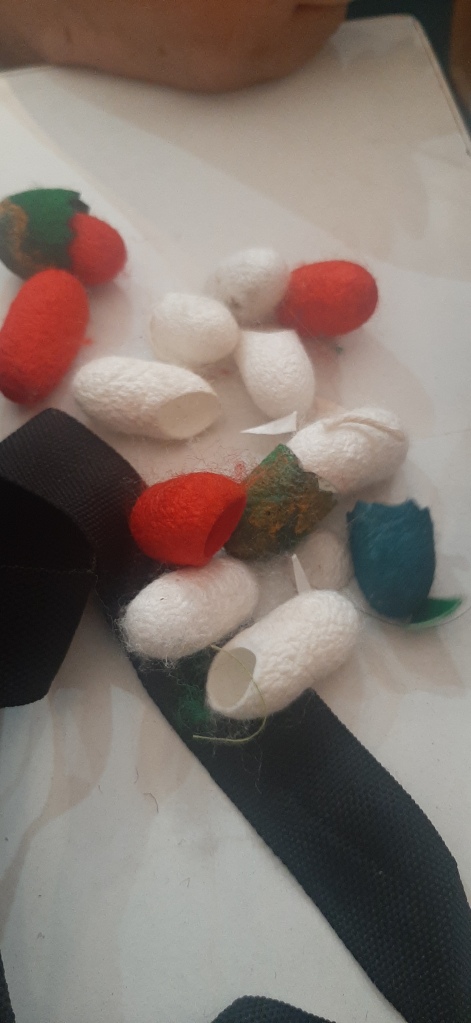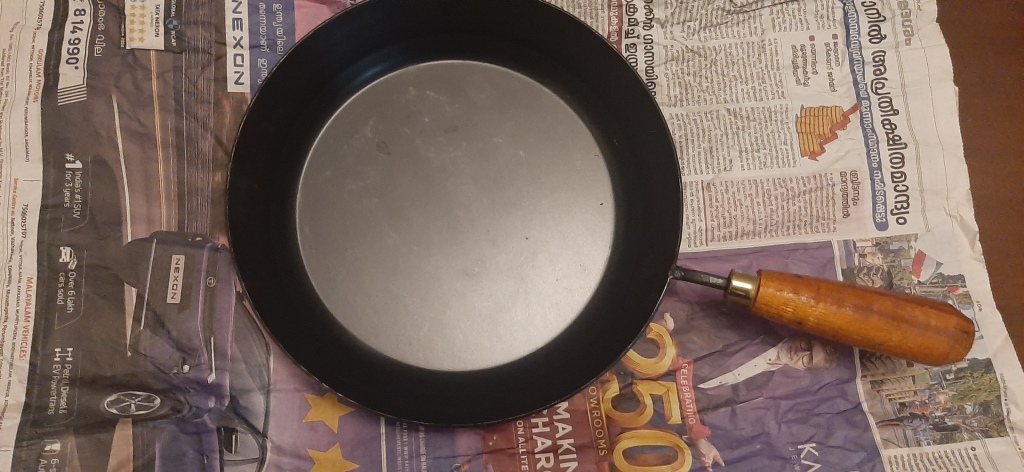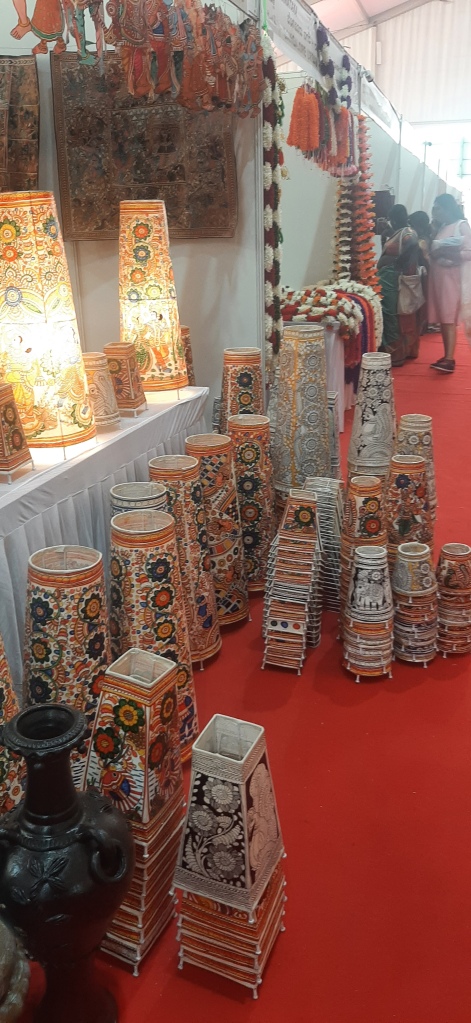I am fascinated by exhibitions. What attracts me the most is the all kinds of things not found in regular stores, specialised shops or supermarkets. Things from the past and also newly experimented. Then there is the variety. Am aware that exhibitions can do away with the meddling of middlemen and almost never miss them.
The landscape of exhibitions has grown and become broader over the years. From being a government driven activity, it now has many private players who curate exhibitions. Activities, performances, demonstrations, food stalls have been added to make it a complete experience for the exhibition enthusiasts.
For the artisans, exhibitions are a combination of many opportunities, the most important being, direct interaction with the customers, getting to know the market demands, products that do well, and why, and to get immediate feedback. They also get future orders and connect with owners of shops, designers and other players. In exhibitions, they receive payment right away and not depend on the consignment model or on the middlemen. So it is not a surprise that, the artisans were one of the worse affected because of the covid restrictions during the pandemic as exhibitions were not held.
Having attended all kinds of exhibitions, small, large, exclusive, niche to the ones designed to attract middle income groups, I want to share my experience of SARAS (Sale of Articles of Rural Artisans Society) melas/ exhibitions which I have attended for over a decade in many different cities.
SARAS mela, started in 1999, has gained popularity over the years. What I recall as a keen customer are also the Gramshree melas organised by CAPART many years ago which had similar format of showcasing products made in the rural areas, handloom, handicraft and other agricultural and value added products like whole spices, spice powders, pickles etc.
For those first generations, who had moved from the rural areas to the cities because of jobs, these exhibitions brought to them products as was used in their villages and also held nostalgic charm and utility value. This section went to these exhibitions looking for baskets, brooms, spices, handloom textile and many others as these were brought ‘as is’ from the rural areas and likely to be authentic. There were also people who had not seen the rural areas of other states, like for example people from Punjab living in a city in Odisha. They went to see and experience a different rural. A lot of customers went because the prices were affordable as these exhibitions did away with the middlemen. Plus, with the travel, stall, and living charges being subsidised by the government, the products were always reasonably priced.
In exhibitions organised by private players which are also exquisite and extremely well curated, the displayed products are usually with much more and deeper design intervention. Entrepreneurs and designers team up to bring new products, make aesthetic changes to the existing products, integrate upcoming market trends, customer demands, environment friendliness etc etc. These products are a class apart and in most cases, much more expensive.
It has also been tried to provide certain permanent space to exhibitions where artisans could display their products round the year in rotation. Dilli Haat was started on this idea and since then many more has been tried.
My most recent experience of SARAS mela, Bangalore 2024
This exhibition had stalls from all the State’s national Rural Livelihood Mission (NRLM) initiatives.

Sturdy, user-friendly, and in many sizes and shapes, cutleries made from areca nut sheath are a true replacement for the plastic, thermocol or plastic lined paper/ leaf plates used in parties and events. They are completely biodegradable and safe as no chemical is used in its processing. I heard later that in the past, small babies were given bath in these sheaths, as there is a nice space created naturally as the sheath is wrapped around the trunk of the tree.

The two people at the stall, a man and a woman, enthusiastic but spoke no other language and did not have any phone based app for payment. This can be a real deterrent as nobody really carries cash and there is also the challenge of finding exact amount and change.

One woman was making decorative garlands from cocoons which I had never seen earlier. She tried to explain to me about the silkworm and how this cocoon is availed but again, language was the barrier.


With increasing popularity and push from e-commerce platforms about iron, clay and stone vessels, there were few stalls selling these. Many sizes, and quite neat. I heard customers asking how to use it and make it ready to keep on fire. Welcoming conversations.
There was a lot of textile. Not surprising as it is the next largest employer after agriculture. Urban livelihoods which were skills learnt new, like beaded and metal based jewellery, or food stuff like pickle and sweets etc.


There was a very well organised foot court, again showcasing cooked food from different states. There was ample space to sit and water points.
The newspapers reported that this exhibition had tremendous footfall. The domestic local markets hold hope for opportunities for products of the country which has so much to offer. The need is to all so take this bigger version of the mela, with multiple products to smaller cities.
This exhibition can be used to survey consumer trends which can help in the product mix, arrangements and get feedback. For example, I have been looking for a cap for the summer from our beautiful textile which are cotton and breathable and shades good for summer which were not available. And a sling bag which has a wide strap so that it does not pinch the shoulder and also has space for a water bottle outside of the main compartment of the bag so as to avoid damage if there is a leak.
These exhibitions also hold the possibility to discuss, showcase R&D outcomes. Environment friendly packaging, new product development, production planning, business planning, digital marketing, new apps and their usage, capacity building needs of the artisans and the people who handle the stalls, and so many of these can be communicated in creative ways since exhibitions have the artisans present and stayingthere. Beside selling, the exhibitions can facilitate interaction on much needed topics.
One of the most heartening observation was the large presence of women in the exhibition. Almost all of them were stall in-charges and were on top of the act of selling. Despite stalls selling similar products, they did not seem competitive and were watching out for each other, bringing food, taking over others stalls when they take bathroom or lunch breaks. There was an amazing sense of sisterhood and solidarity.
No plastic was used and cloth bags were provided to all the stalls. Just that the bags need to be made in varied sizes as a clay vessel or a necklace had the same size bag and it did not make sense.
I do believe if craft has to survive and flourish, that our environmental concerns, consumption patterns are to be addressed, it needs to be adopted by larger number of people. Only scale can bring about these results. One person carrying a cloth bag, eating organic, wearing organic, natural dye clothes, using public mode of transport, using public facilities, using local etc., can be a role model, but has minimal impact in bringing substantial change to the situation. We need certain critical volume to alter the course of mass production and consumption and issues related to the same, of unethical, unfair, unjust, unsustainable exploitative market practices that are creating massive destruction of the environment and institutions at multiple levels.
























